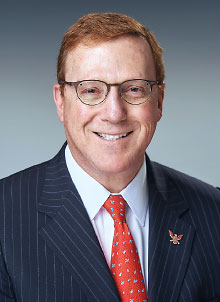Grand Challenge Aims to Eradicate MH Stigma
Abstract
The Huntsman Mental Health Institute is bringing together dozens of national organizations, including APA, in a large-scale, collaborative effort to end the stigma of mental illness and substance use disorders for good.
Until the stigma associated with mental health and substance use disorders is eliminated, psychiatric patients will continue to be treated as second-class citizens, said Mark Rapaport, M.D.
“Their concerns will continue to be dismissed, they will continue to be criminalized, and their care will continue to be undervalued,” said Rapaport, CEO of the Huntsman Mental Health Institute (HMHI) at the University of Utah. “We have to eliminate the ignorance and prejudice that exist around these illnesses. If we don’t, patients will continue to needlessly suffer and die because they’re not seeking [care] that should easily be available to them.”
The urgency to save the lives of patients in need has motivated an expansive new initiative that HMHI recently launched with the goal of ending stigma for good. Named the “Grand Challenge,” the campaign unites dozens of organizations with the shared goal of eliminating stigma against people experiencing mental or substance use disorders, with HMHI acting as what Rapaport referred to as the backbone. “Our goal is to help these organizations succeed by facilitating and coordinating their efforts so they can truly eliminate stigma,” he said.
According to an HMHI news release, a grand challenge is a “social change movement that shifts beliefs, attitudes, and behavior.” Similar movements in the past included those to address seatbelt use, recycling, and tobacco use. “Most grand challenges have broad support, take place over decades, and have multifaceted strategies to meet a full range of needs,” the release stated.
HMHI’s “Grand Challenge” is using the Collective Impact Model, which includes five essential elements: a common agenda shaped by a collective definition of the problem; shared measurements among the partners to track and share progress; integration of the partners’ activities to maximize the results; continuous communication; and a backbone team to coordinate the group’s work.

“The COVID-19 pandemic has brought mental illness to the forefront of public discussion,” says Saul Levin, M.D., M.P.A. “Now is the time to take advantage of that public awareness and end the stigma of mental illness once and for all.”
The kickoff event was held in Utah in April. Experts, including APA CEO and Medical Director Saul Levin, M.D., M.P.A., participated in the Design Studio event, during which they laid out the goals of the campaign to eliminate stigma from all sectors of U.S. society. According to HMHI’s website, those goals include establishing sustainable funding models, creating outreach plans to connect with underserved communities, and building infrastructure to coordinate and communicate about evidence-based best practices. In addition to APA, participants at the Design Studio event included representatives from the National Alliance on Mental Illness, the American Psychological Association, the National Association of Social Workers, and the American Foundation for Suicide Prevention.
“It was an amazing meeting of leaders,” Levin said. “We agreed that we need to, essentially, blanket the airwaves—saturate television, radio, and the print media—with the message that mental illness is similar to any other illness, like diabetes or hypertension, that requires treatment to allow patients to feel the way they want to feel.”
Levin was appointed to the campaign’s Steering Committee; Kristin Kroeger, APA’s chief of policy, programs, and partnerships, was appointed to the Summit Planning Committee; Nitin Gogtay, M.D., APA’s chief of research and a deputy medical director, was appointed to the Matrix Committee; and Bob Ensinger, M.P.A., APA’s chief communications officer, was appointed to the Outreach and Communications Committee.
Eliminating the stigma around mental illness has been a focus for Levin since he became APA’s CEO and medical director, he said. Decades ago, patients would not openly discuss breast cancer diagnoses, he pointed out. But now, thanks to advocates’ work to raise awareness, it is a very visible and treatable disease. The same must be done for mental illness, he said.
The difficulty with most campaigns to end mental health stigma is they often occur in silos, Rapaport said, with organizations lacking the resources to successfully communicate and collaborate. That’s where HMHI comes in. He pointed to a 2016 report from the National Academies of Science, Engineering, and Medicine. The report explored how successful anti-stigma campaigns have operated in other countries, and stated that, in order to eliminate or significantly reduce stigma in the United States, a coordinated and sustained effort that lasts at least two decades is necessary. HMHI is prepared to make that multi-decade commitment to the Grand Challenge, Rapaport said.
“One amazing thing about this initiative is that we have the tremendous support of the Huntsman family, who have been willing to talk honestly about their family’s struggles with mental and substance use disorders,” he said. HMHI was established thanks to a $150 million gift that the Huntsman family, including former Utah Gov. Jon Huntsman Jr., made to the University of Utah in 2019.
The Grand Challenge is still growing, with organizations continuing to join, and the next step is another Design Summit in Snowbird, Utah, in October. There, participants will discuss the efforts they can implement on a local level and across the country to eliminate stigma. Rapaport said that representatives from between 100 and 200 organizations are expected.
“Why should people who have diseases of the most complex organ in the body not be treated with the same dignity and respect that people with heart disease or cancer receive?” Rapaport said. “Our patients and their families deserve that respect.” ■



